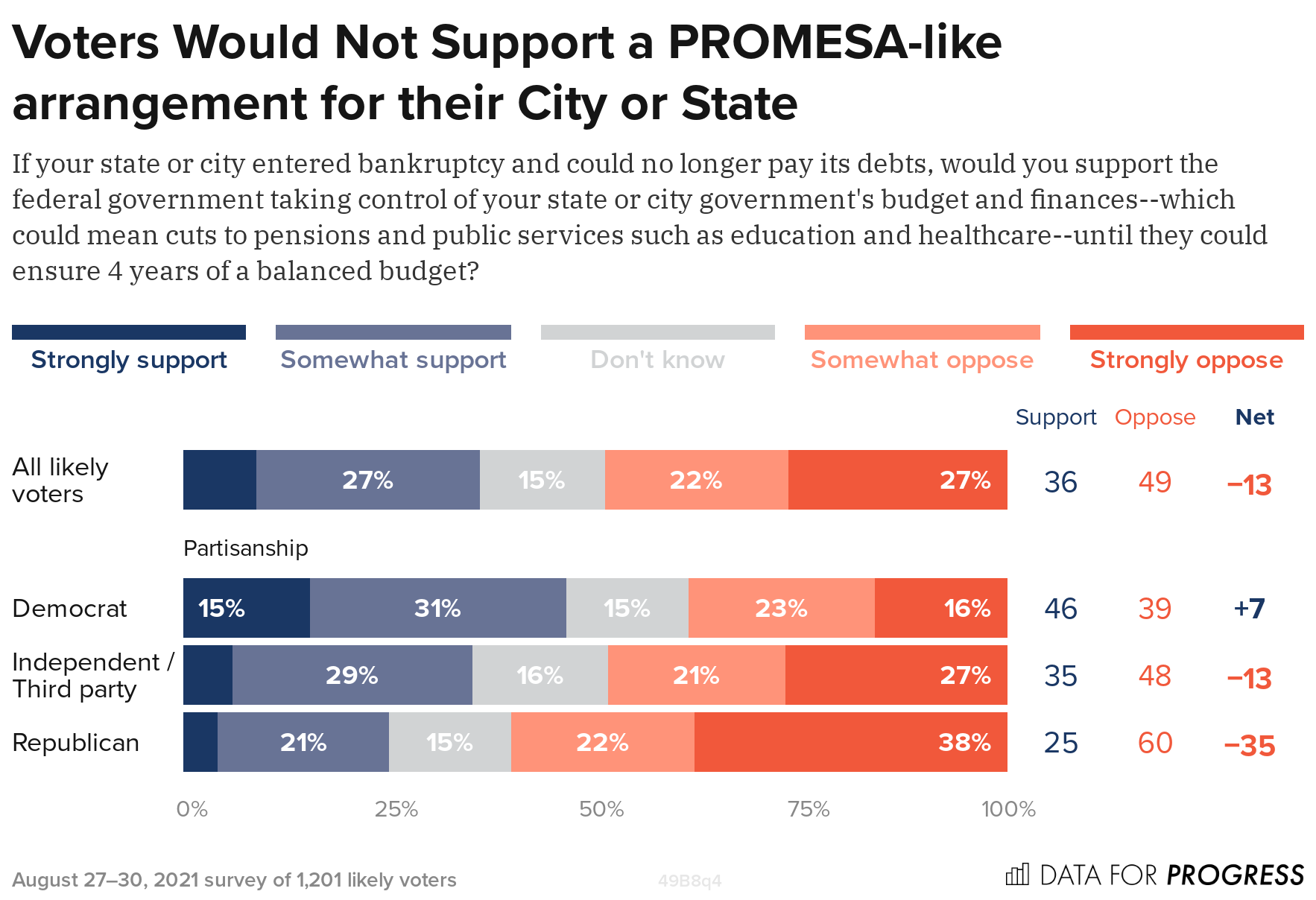Undemocratic and Unsupported: Americans overwhelmingly oppose the Federal government's takeover of Puerto Rico's finances
By Edoardo Ortiz and Gustavo Sánchez
Voters in Puerto Rico and in the U.S. agree: it’s time to change course on PROMESA.
The U.S. government’s takeover of Puerto Rico's finances is now 5 years underway. It’s appointed Oversight Board has made drastic cuts to essential service and encouraged privatization of utilities. Many argue that after multiple natural disasters and a mass exodus, PROMESA’s strategy is misguided. Critics of PROMESA have called out its austerity-focused approach, its conflicts of interest, and its democratic legitimacy. They argue it hasn’t succeeded at doing what it claims to do — put Puerto Rico on the track to solvency. As Puerto Rico languishes, we must remember that Congress designed PROMESA. Federal legislators must be held accountable for its systemic failures.
In our survey of Puerto Rico voters in late 2020, we found that an overwhelming majority view the Fiscal Oversight and Management Board (FOMB) unfavorably — 70 percent have a somewhat or very unfavorable view of the FOMB). Among voters who support statehood 57 percent view the FOMB unfavorably, and among those who oppose statehood 82 percent view the FOMB unfavorably. MVC and PPD affiliated voters have the least favorable opinions, while PNP voters are split about evenly (48 percent total favorable and 44 total unfavorable). Voters on the islands who identify as Republicans are split similarly to the PNP, while those who identify as Democrats view the FOMB very unfavorably (80 percent total unfavorable). It’s clear that Puerto Ricans on the islands have grown tired of PROMESA after years of implementation and the undemocratic takeover of the islands’ finances. They need Congress to act urgently.
More recently, we asked U.S. voters about PROMESA and if they favored different reforms to the legislation.
First, we asked if the Oversight Board should be eliminated, giving Puerto Rico’s government control over its own finances again. Half of respondents said they would support this change (50 percent) with only 23 percent opposing, giving the proposal a net support of +27. Though one of the most controversial, this proposal received equal bipartisan support, with both Democrats and Republicans favoring it by a margin of +29.
Voters also support proposals that would address economic concerns — including protecting pensioners and local creditors in the bankruptcy process and terminating part of Puerto Rico’s debt. Both proposals are even more favored than the elimination of the board, having a support margin of +54 and +31 respectively. Democrats are slightly more supportive than Republicans (67 percent support and 64 percent support respectively) but not by a lot.
Voters also support various reforms to address corruption concerns like: Preventing hedge funds from exerting undue power, Preventing federal funds from being used for debt repayment, and auditing the debt — which would allow an investigation to determine the validity and legitimacy of Puerto Rico’s debt.
Even before PROMESA was enacted critics identified how undemocratic it was. How could Congress take away a local government’s right to govern? Doesn’t that fly in the face of democracy itself? In addition to asking about reforms to PROMESA itself, we also asked voters if they would accept a similar arrangement to the Oversight Board if their city or state was bankrupt? Voters solidly rejected this undemocratic approach to debt restructuring by a margin of -13.
PROMESA’s approach has been tried and now rejected by both American and Puerto Rican voters. If Congressmembers lived in states under threat of an Oversight Board, they would fight it tooth and nail — rightfully so. They would understand that an unaccountable entity with a laser focus on austerity would be harmful to their states and communities. Why, then, impose it on others?
If Congress won’t listen to the critiques of those in Puerto Rico and the many organizations calling for change, they should listen to the broadly bipartisan group of constituents who, as we’ve seen, demand better for their fellow citizens. Unlike many issues currently being pushed in Congress, reforming PROMESA is not an issue that divides us along party lines. When presented with information about the situation, voters of all persuasions agree it is undemocratic, unfair, and that reform is needed.
Edoardo Ortiz (@edoardo_ortiz), MPP, is originally from Bayamón and studied at the University of Puerto Rico and the University of Chicago. He specializes in policy research, focusing on economic policy, and Puerto Rico history and economics.
Gustavo Sanchez (@lgsanchezconde) is a Principal at Data for Progress.
Methodology
From August 27 to 30, 2021, Data for Progress conducted a survey of 1,201 likely voters nationally using web panel respondents. The sample was weighted to be representative of likely voters by age, gender, education, race, and voting history. The survey was conducted in English. The margin of error is ±3 percentage points.
From October 19 to November 1, 2020, Data for Progress conducted a survey of 527 likely Puerto Rico voters using SMS and web panel respondents. The sample was weighted to be representative of likely voters by age, gender, education, income, religion, partisanship, referendum vote, and senate district. The survey was conducted in Spanish and English. The margin of error is ±4 percentage points.





